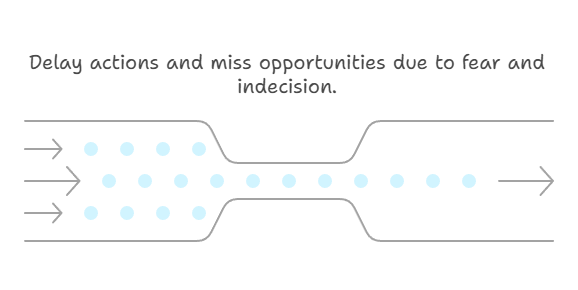What Am I Waiting For? What’s Stopping Me From Taking the Next Step?

The Quiet Hesitation That Holds You Back
You’ve been thinking about this for weeks, months, maybe even years. The idea of building your own business excites you—but when it comes to taking the next step, something stops you. For ambitious women striving to transition from corporate success to personal fulfillment, this hesitation often stems from a deep internal conflict: balancing the need for security with the drive to create something meaningful. The gap between where you are now and where you want to be feels vast, like standing at the edge of a canyon. Fear whispers, “What if you fall?” Uncertainty chimes in, “What if you don’t have what it takes?” And perfectionism adds, “Wait until you’re ready.”
“What am I waiting for? Why can’t I just start?”
This question echoes in your mind as you lie awake, grappling with the tension between practicality and aspiration. Deep down, you know the answer. It’s not a lack of skills or ideas—it’s fear, uncertainty, or the overwhelming thought of everything that needs to be done. But here’s the truth: waiting doesn’t bring clarity—action does. For women like you, who dream of building a legacy, taking the first step is not just an option; it’s the key to unlocking your purpose.
Step 1: Understand What’s Stopping You
Taking the leap into entrepreneurship feels huge because it is. For professionals in high-stakes roles, the fears can be uniquely intense: worrying about losing a steady income, tarnishing a hard-earned reputation, or risking failure after years of success. But identifying what’s holding you back can make the challenge feel smaller and more manageable. To move forward, it’s essential to dissect the underlying causes of hesitation and understand how they intersect with your personal and professional values.
Questions to Reflect On
- Am I afraid of failing or making mistakes?
- Do I feel unprepared or unsure where to start?
- Am I waiting for the “perfect” moment that might never come?
Expand Your Awareness
Recognizing your fears doesn’t mean you’re weak—it means you’re self-aware. Fear often thrives in ambiguity, so give it a name. Write down the specific things you’re afraid of. Are you worried about finances? About what others will think? When you name your fears, they lose their power.
- Example: Fear of failure could mean you’re afraid of rejection. Understanding this helps you create a plan to mitigate it.
- Practice: Try journaling about the first time you’ve overcome fear in your life—what worked then?
- Pro Tip: Think of fear as a sign you’re moving outside your comfort zone—and that’s where growth happens.
- Metaphor: Fear is like a shadow—it looms large only when you avoid shining light on it.
- Story: Consider Sarah, who waited for years to start her business, thinking she wasn’t ready. Once she wrote down her fears, she realized most were rooted in outdated beliefs, not reality.
- Quote: “Fear is a reaction. Courage is a decision.” —Winston Churchill
Step 2: Reframe Waiting as a Choice
Every day you wait is a day you’re choosing to stay where you are. Waiting feels safer, but it also comes at a cost—time, opportunities, and the chance to fulfill your potential.
The Hidden Costs of Waiting
- Lost Time: The longer you wait, the further away your dreams feel.
- Missed Opportunities: The “perfect moment” doesn’t exist—opportunities come to those who act.
- Unfulfilled Potential: You’re capable of so much more than what you’re doing now.
Flip the Script
Reframing waiting as a choice puts the power back in your hands. You’re not stuck—you’re deciding to stay still, and you can choose to move forward instead. For driven professionals, this reframing aligns with values of independence and legacy-building, making the decision to act not just a step forward, but a step toward living authentically and creating meaningful impact.
- Example: Instead of thinking, “I’ll start when I’m ready,” think, “Starting will make me ready.”
- Practice: At the end of each day, reflect on one small action you took and how it moved you forward.
- Pro Tip: Break big goals into micro-goals. Completing one small task daily is better than waiting for perfect conditions.
- Metaphor: Waiting for the perfect moment is like standing at the edge of a pool, waiting for the water to feel warmer. The only way to adjust is to jump in.
- Story: John always waited for the “right” time to leave his corporate job. It wasn’t until he reframed waiting as a decision to delay his dreams that he took the leap.
- Quote: “The best time to plant a tree was 20 years ago. The second-best time is now.” —Chinese Proverb
Step 3: Start Small, but Start Now
The next step doesn’t have to be huge. In fact, the smaller and more specific it is, the easier it will feel to take action. For professionals with ambitious, purpose-driven goals, these small steps act as building blocks, aligning incremental progress with their long-term vision. Small steps not only create momentum but also allow you to refine your direction as you move forward, ensuring your actions remain aligned with your larger purpose and legacy.
How to Start
- Define Your First Step: What’s one small, actionable task you can complete today?
- Examples: Write down your business idea, send an email to a mentor, or research your target market for 30 minutes.
- Commit to a Timeframe: Set a deadline for yourself to complete that first step. Progress thrives on urgency.
- Build Momentum: Once you take the first step, the next one will feel easier. Progress builds confidence, which fuels more action.
- Example: Writing a one-paragraph business concept instead of drafting a full plan.
- Practice: Block 15 minutes in your calendar daily for focused work.
- Pro Tip: Track your progress visually—use a checklist or app to see how far you’ve come.
- Metaphor: Small steps are like planting seeds. Water them consistently, and they’ll grow into something remarkable.
- Story: Emma, a mother of two, started her Etsy shop by dedicating 10 minutes nightly to crafting. A year later, it’s her full-time business.
- Quote: “The journey of a thousand miles begins with a single step.” —Lao Tzu
Step 4: Let Go of Perfectionism
If you’re waiting for the perfect moment, the perfect plan, or the perfect skill set, you’ll be waiting forever. Perfectionism is a silent killer of dreams.
Embrace Imperfection
-
Progress > Perfection: Small wins compound into significant results.
-
Learning by Doing: The best lessons come from experience, not waiting.
-
Clarity Through Action: Each step reveals the next.
-
Example: Launch a simple website instead of waiting to perfect your design.
-
Practice: Celebrate small wins—even messy ones.
-
Pro Tip: Set a timer to work on something imperfectly. When the timer ends, it’s good enough.
-
Metaphor: Perfectionism is like trying to sculpt a statue before you’ve even shaped the clay.
-
Story: Rachel launched her blog with typos and all. Readers loved her honesty, and she learned to improve as she went.
-
Quote: “Imperfect action beats perfect inaction every time.” —Harry S. Truman

FAQ Section: Overcoming Hesitation in Entrepreneurship
1. What’s the best way to overcome fear of failure?
Fear of failure is natural but often exaggerated. Start by identifying the worst-case scenario and ask yourself, “Could I recover from this?” Most fears diminish when you realize they’re manageable. Focus on small, low-risk actions that build confidence.
2. How can I know if my business idea is worth pursuing?
Validation is key. Share your idea with trusted friends or test it on a small scale. Use platforms like Google Trends to assess demand or SurveyMonkey to gather feedback. If people respond positively, you’re on the right track.
3. What tools can help me get started?
Free tools like Trello for task management and Canva for simple branding are invaluable. Additionally, productivity apps like Notion or Evernote can help you stay organized.
4. How do I find the time to work on my business?
Time management starts with prioritization. Dedicate 15–30 minutes daily to focused work—consistency matters more than long, sporadic efforts. Eliminate distractions and protect this time as if it were a critical appointment.
5. What if I don’t have the resources to start?
Start with what you have. Leverage free tools, connections, and skills. Remember, resourcefulness is more important than resources. Many successful entrepreneurs began with minimal budgets.
6. How do I stay motivated during setbacks?
Reconnect with your “why”—the reason you started. For many women transitioning from corporate life to entrepreneurship, the "why" often centers on creating a meaningful impact and achieving holistic success. This could mean building a business that aligns with your core values, providing for your family while pursuing personal growth, or leaving a legacy that inspires others. Create a vision board or journal about your goals, tying them to the impact you want to have and the balance you hope to achieve. Surround yourself with supportive people who understand your vision and celebrate progress, no matter how small—every step brings you closer to your purpose.
Imagine the Momentum You Could Create
Picture this: You wake up tomorrow and decide to take one small step. It feels manageable, so you do it. That step leads to another, and another. Before you know it, you’re no longer stuck—you’re building momentum.
Each day, you’re moving closer to the business and life you’ve always dreamed of. It’s not about giant leaps—it’s about showing up for yourself, consistently and courageously.
What’s Holding You Back From Starting Today?
Fear is natural, but so is your ability to overcome it. Ask yourself: What’s the worst that could happen if I take the next step? And what’s the best that could happen if I succeed?
The truth is, the only way to move forward is to start.
Stop waiting and start moving.
If something in this post hit home—this might be your moment to step into real clarity.
About the Author
Juan Carlos Arzola, CHPC, is a faith-driven visionary, proud Peruvian, and devoted single father of two incredible sons, living and thriving in Miami. As a Certified High-Performance Coach to the world’s most ambitious achievers—leaders pursuing transformative dreams such as Nobel Prizes, United Nations initiatives, and NASA-level innovations—Arzola is deeply committed to empowering others to lead lives of significance.
Arzola is the founder and CEO of Ask.me, a revolutionary platform designed to help professionals successfully transition into entrepreneurship. His own inspiring journey from employee to thriving entrepreneur reflects his unwavering belief in transformation through faith, purpose, and strategic leadership.
A best-selling author, Arzola wrote The Success Start: Proven Practices to Build a Life of Significance, a guide that has empowered countless readers to define and achieve their personal and professional goals. The book is available on Amazon and at the prestigious Harvard Book Store. As a co-author of The Big Question with broadcasting legend Larry King, he shares profound insights on life, leadership, and legacy. Learn more about his collaboration with Larry King here.
A sought-after speaker and podcast guest, Arzola has shared his expertise on renowned platforms including The Culture Matters Podcast, Grown Folks Talking Live, and The Dreamcast Podcast. With a focus on personal growth, high performance, and creating meaningful impact, he equips high achievers with actionable strategies and inspiring insights to refine their visions and achieve measurable success.
Arzola’s work blends practical wisdom with a deep sense of purpose, helping individuals unlock their full potential and leave lasting legacies. Learn more about his mission to transform lives and inspire change at Ask.me.


